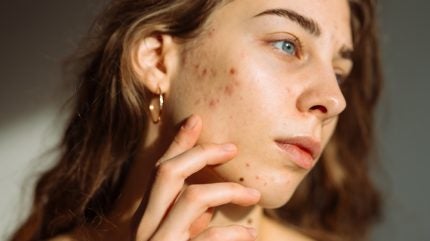
Sagimet Bioscience’s denifanstat, a one-daily pill for the treatment of acne, has succeeded in a Phase III trial, with the biotech’s license partner Ascletis Bioscience set to submit the drug for regulatory review in China.
The Chinese Phase III study (NCT06192264), which was conducted by Ascletis, saw denifanstat achieve a 33.2% treatment success in patients with acne vulgaris taking the oral medication for 12 weeks. This compared to just 14.6% in the placebo cohort. Treatment success, one of three primary endpoints, was defined via a skin clearance score.

Discover B2B Marketing That Performs
Combine business intelligence and editorial excellence to reach engaged professionals across 36 leading media platforms.
Denifanstat also delivered on the randomised trial’s two other primary endpoints. Patients experienced a 57.4% reduction in skin lesions, compared to 35.4% for placebo, along with a 63.5% drop in inflammatory lesions versus a placebo value of 43.2%.
In terms of safety, the drug performed well. The incidence rates of treatment-emergent adverse events (TEAEs) were comparable between 50mg denifanstat and placebo. Only two categories of TEAEs had an incidence rate of more than 5%, which was dry skin and dry eye – common side effects in acne medications. Ascletis’ report rounded off by stating there were no high-grade or serious adverse events.
On the back of the data, Ascletis, which licensed the China rights from Sagimet in 2019, indicated that it plans to submit denifanstat for approval to the China National Medical Products Administration.
“We are extremely pleased with the topline results of our Phase III trial. Denifanstat tablets demonstrated impressive efficacy beyond treatment success, showing significant reductions in total lesion count, inflammatory lesion count, and non-inflammatory lesion count. We are excited to be submitting this innovative treatment with the China National Medical Products Administration (NMPA) soon,” said Jinzi Jason Wu, CEO of Ascletis.

US Tariffs are shifting - will you react or anticipate?
Don’t let policy changes catch you off guard. Stay proactive with real-time data and expert analysis.
By GlobalDataWhilst it has not been compared to already approved products in head-to-head comparison trials, Ascletis did layout denifanstat’s scores compared to rivals. Compared to popular treatments sarecycline and doxycycline, denifanstat performed stronger across a range of efficacy endpoints after 12 weeks.
While sarecycline and doxycycline are both antibiotics, denifanstat works by targeting fatty acid synthase (FASN) to reduce the production of facial sebum, an underlying cause of acne.
Over 50 million people in the US live with acne. Due to the size of the acne market, and the variety of treatments available, analysis on the leading drug product is hard to ascertain. Antibiotics are usually the first choice for treating acne, followed by stronger drugs such as Roche’s Accutane (isotretinoin) later prescribed if little skin clearance is observed.


